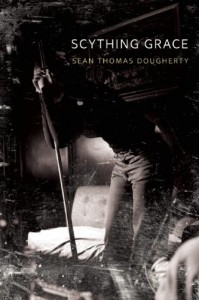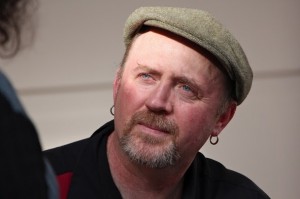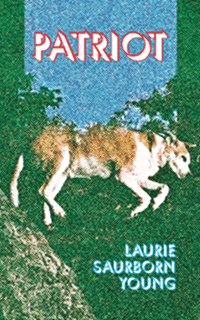An Interview with Sean Thomas Dougherty
I first met Sean Thomas Dougherty at my first AWP conference, Denver 2010. I had been wandering the overwhelming aisles of the Book Fair, wondering what I had gotten myself into, when I found myself at the BOA table. A book called Sasha Sings the Laundry on the Line caught my eye. That mesmerizing title with the Eastern European name, the cover art of colorful dresses and towels hanging between sooty apartment buildings, a wedge of blue sky above – it reminded me of my old neighborhood of Midwood, Brooklyn, and when I picked up the book I read the name. This was a guy whose poems I had long admired, and I hadn’t realized he had a new book out. When paying for Sasha, the BOA rep behind the table asked, “Would you like Sean to sign it?” I told her I needed to get going, but then she pointed behind me: reddish hair under a cool hat, big hooded sweatshirt, pale blue eyes, warm smile: Sean Thomas Dougherty. Signing his book, Sean wanted to know my story right away. He lit up when I told him I was a college dropout. “You’ve got to put that in your author bio,” he said.
Sean and I have kept in touch since Denver, mostly via email and Facebook. Sean is hands-down my favorite Facebook presence. His barbs at mediocre poetry, his posts of music videos on his “Punk Rock Sundays,” and his constant promotion of indie magazines and presses, as well as of the poets he loves, is something I look forward to daily. When I heard Sean had a new book in the works, I contacted him about doing an interview. That book, Scything Grace, is now out with Etruscan Press. Dougherty’s poems sing of the tough realities of American city life, with a voice influenced by Lorca and Vallejo, Levis and Hull, but a voice truly all his own. He draws close the lives and deaths of those he loves, and sees and hears the stories of the American poor and working class all around him. His poems from the beginning have challenged the division between poetry and prose, and are loyal to nothing if not sound, and great feeling. Poet Dorianne Laux has written that Dougherty is a poet “of grand and memorable vision . . . the gypsy punk heart of American poetry.”
In the following interview, conducted via email over a few days last May, Sean and I discuss Scything Grace, the line versus the sentence, Li-Young Lee, and the duende.
***
 Justin Bigos: Your latest book of poems, Scything Grace, shows you continuing to push the formal possibilities of your poetry, as well as hitting what I hear as a more recent note in your work: the voice of an older, more self-aware poet, who carries his ghosts through the streets and witnesses language and song everywhere, as if the world were scripting itself, singing itself daily into existence. Can we start our conversation by looking at this book as the next chapter in your life’s body of work? How have you changed as a poet since Sasha Sings the Laundry on the Line?
Justin Bigos: Your latest book of poems, Scything Grace, shows you continuing to push the formal possibilities of your poetry, as well as hitting what I hear as a more recent note in your work: the voice of an older, more self-aware poet, who carries his ghosts through the streets and witnesses language and song everywhere, as if the world were scripting itself, singing itself daily into existence. Can we start our conversation by looking at this book as the next chapter in your life’s body of work? How have you changed as a poet since Sasha Sings the Laundry on the Line?
Sean Thomas Dougherty: This is a hard question for me because I haven’t really “read” Scything Grace yet. It is an improvisatory collage. So I will answer in an improvisatory collage, which is the way I’ve started to write more and more in the last decade. The way closest to how I think, how I feel.
Back in May 2012 I was walking with my friend the poet Corey Zeller at the park on the west side of Erie, Pennsylvania, where I take our children to run through the last cherry blossoms. Pale petals we are. Sometimes when I walk I will just start talking to Corey poems and he will say, write that shit down. And I say, no one time. The poem is now gone. I’ve been doing this for decades for my friends. I say I am a walking saxophone. I say I am the words hiding all around us. Monk once said he has a hard time not hearing the music, it is everywhere, he wants to reach up and catch it as it passes us by. Flea, the bassist from Red Hot Chili Peppers, says the same thing. Everything has a beat. Think of a billion living things, the smallest insects. Human hearts. The rush of traffic. A swallow’s wings sing the air. I actually “write” very little all year. I write maybe two months and then the rest of the time I live, I collect, I listen, but I say poems all the time. I think part of being a poet is to live the poem, so I spontaneously make poems for the people I care about. I make poetry part of the fabric of us.
In May 2012 I had just finished a grueling grind-out manuscript for BOA of my Selected Poems to appear in 2014. Some of the poems in there I had been crafting for over six years. Corey’s best friend Jeremy, who I had known for years too, had just hung himself. Corey was dealing with his death and trying to write poems in his voice. It was spring. We walked carrying such weight. My love Lisa was very sick. My second daughter had been born in January. My oldest, Amara Rumi, was four. She ran with Corey’s son Malcolm. To live in a city of rust along a lake between nations. Our children are a lake between nations. Corey said now that you have finished your Selected you should write a book the way you speak poems. Just riff them fast. But write them down.
I said, yeah like Sonny Rollins playing with the birds on the Williamsburg Bridge. Legend has it when Rollins felt stuck he spent a year listening and playing with the birds on the bridge. He disappeared into life to find a new sound, a new tone. I needed to find a new tone. To return into the improvisatory language that drove me to poetry thirty years ago. For decades I’ve been pulled into the river. Now I gave myself permission to not swim but drown in it. I was also interested in writing much shorter lyric poems. My love Lisa is very sick and her favorite poems are my shorter lyric poems.
So two very important people in my life pushed me to make this book of short improvised lyrics. Then I expanded the breath to close. It is a Book of Breaths.
I started with a quote from Cavafy. In many ways the entire new book Scything Grace was driven by these lines from Cavafy’s poem “The City” :
“…I see the black ruins of my life, here,
Where I’ve spent so many years, wasted them destroyed them totally.”You won’t find a new county, won’t find another shore.
The city will always pursue you.
I wrote 80 percent of Scything Grace in a sort of old school improvisatory haze fueled by the duende, black coffee, and cigarettes over four weeks in May 2012. After I was done, I hit spell check, told my friends I was sending it out. It was done. I wrote it linearly one poem after another, day after day, sometimes two or three poems per day. I sent it out on a Saturday night in late June, I think, to Four Ways Books, Etruscan Press, and Black Ocean Books. On Monday afternoon Phil Brady of Etruscan called me up ecstatic to accept it.
JB: I’m really interested in how you articulate some of the paradoxes of the poem – at least the kind you write and are drawn to – especially the paradox of the poem as something received yet also made. It is you, Sean Thomas Dougherty, writing these poems—but as a kind of conduit, a witness. In that sense, the writing seems less about arranging sound and experience than transmitting it. If this is true, how do you know when to improvise, when to guide, when to allow your own will in there to have its say?

STD: You can’t teach someone to make metaphors, but you can teach the structure and examine how they are made or why certain images arise from the imagination, the way the French phenomenologist Gaston Bachelard in his profound book The Poetics of Space points to rooms, windows, doors, spaces intimate and grand, the juxtaposition between things, between worlds. But in the end there is an unnamable space to the making, that is the human spirit, soul I dare say, history of language and learning, the imagination made manifest in words. But it is also the body. The body remembers. So while the mind may let go the body becomes an instrument of sight, and very particular for the poet, of sound.
A Review of Patriot, by Laurie Saurborn Young
 Patriot
Patriot
by Laurie Saurborn Young
Forklift, Ohio
32 pages / $5 Buy from Forklift, Ohio
Laurie Saurborn Young’s chapbook, Patriot, is a book of horizons, a book of lines – “of thunderstorms on the weather map,” of women on treadmills, of two hundred beer cans on the wall of a fourteen-year-old, of water towers and shuttered factories, of fighter planes above a parking lot in New England, of telephone poles and road kill, of “voters turned away.” The poems, thirteen total, each composed of twenty-six double-spaced lines, are each named “Patriot,” the same name as the book. This formal orderliness, along with the speaker’s measured yet persistent voice and the rank-and-file American subject matter, is in wonderful counterpoint to the great chaos of America inside the chapbook’s stapled pages. The speaker struggles to expand the definition of America, of course; but these are not Whitmanesque poems. Instead, there is a fierce constriction both in the music and imagery of these often-heavily enjambed lines, which create a shard-like collage of “America,” the place where the speaker struggles to locate herself.
The speaker of Patriot is decidedly female, and the theme of misogyny runs throughout the chapbook. The recurring image of the voting booth during an election year helps establish a sense of national urgency, and reminds the reader, specifically, of the 2012 presidential election, in which women’s rights were in the political spotlight, as right-wing politicians attacked the rights of women on multiple fronts. The speaker says, “Still throwing women in the water to see if is America.” Here, as in many of the lines of these poems, the poet uses epistrophe to delay the phrase we come to expect: “is America.” It’s a kind of reversal of Ginberg’s “America,” and gives the poems a much more feminine, feminist energy. The poems are bold, but they are not cocky or smug. They are not shouting at us. The inverted syntax and enjambments allow us to hear the internal voice of an American woman who feels genuine fear for her safety and her rights. The labyrinthine twists and turns in these poems are like a skier on a slalom – which is the exact metaphor Polish director Kristof Kieslowski used to describe what is was like to make films subject to strict censorship. In fact – and surprisingly – Kieslowski said that censorship helped him make better films. While Young’s poems are not subject to state censorship, we can hear the anxiety of utterance in this voice. These poems may at times sound cautious, but they are not afraid. On the contrary, they speak with candor, a seething anger, great intelligence, and a mesmerizing lyricism.
June 17th, 2013 / 11:00 am
